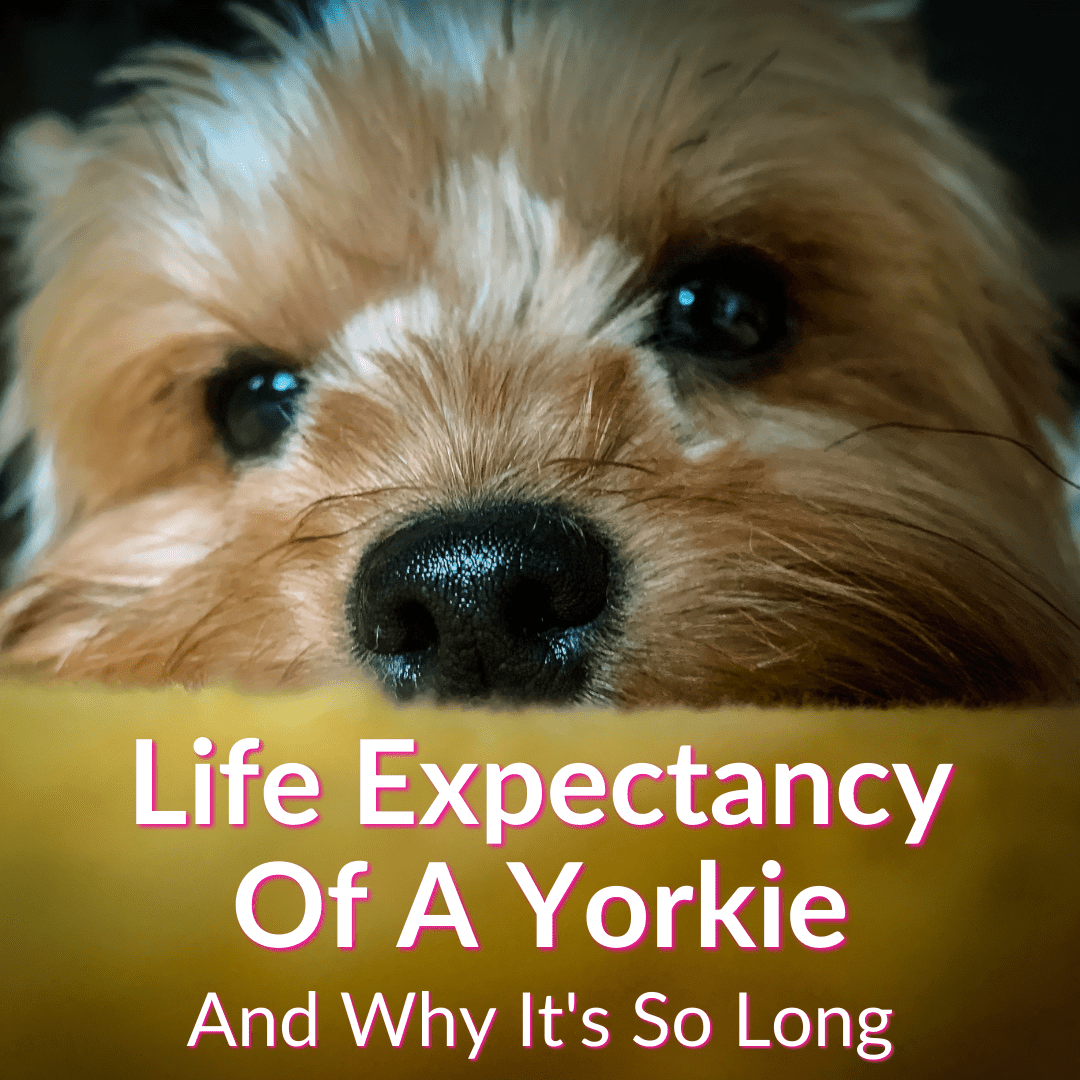
But that’s not going to happen.
Eventually, your pup’s beautiful life has to come to an end.
But what is the average life expectancy of a Yorkie?
How long can you expect to have your adorable little pup in your life?
Keep reading to learn the average lifespan of a Yorkie, why it is longer than most breeds, and some of the leading causes of death in Yorkshire terriers.
What Is The Lifespan Of A Yorkie?
There average lifespan of a Yorkie is between 12 and 15 years. The median life expectancy is 13.5 years.
The lifespan can vary quite a bit from country to country. For example, the recorded lifespan in the United States 12.67 years, while it is only 11.07 years in the United Kingdom.
It should be noted that those numbers only include dogs that died of natural causes. When you take premature deaths due to injury or other causes into account, the average life expectancy drops to 11.1 years.

There is also variance among the sexes. Female Yorkshire terriers tend to live longer than the males: 1.5 years longer on average.
It is virtually impossible to calculate the average lifespan of dogs in general, since there is so much variation among breeds. But Yorkies rank on the longer end of the spectrum.
Why Yorkies Have Longer Lifespans
There are a few reasons why Yorkshire terriers life longer than most other dogs. The two primary reasons are the following:
- Smaller dogs live longer than larger ones: as a toy breed, Yorkies are one of the smallest and thus one with a longer lifespan; but not the longest
- Yorkies are a healthy breed overall: they do tend to suffer from a number of congenital health defects, but do not have nearly as many health issues overall as many other dog breeds and the ones that are common in Yorkies are rarely lethal
Now let’s take a look at the leading causes of death in Yorkies. Knowing this can help you protect your pup from these issues, thus hopefully extending its life.
The leading causes of death in Yorkies differ for puppies and for adult dogs. Let’s start with the young dogs.
Leading Causes Of Death In Yorkshire Terrier Puppies

These are the two most common causes of death in Yorkie puppies.
Infections
Infectious diseases are the main cause of death among young Yorkshire terriers. Three common diseases are:
Parvovirus
The parvovirus is highly contagious and often fatal. It attacks the immune system and intestinal tract of dogs, causing extreme nausea, vomiting, and loose stool. It can quickly lead to dehydration and death.
The good news is that there is a vaccination. But it can still happen that your Yorkie puppy contracts “Parvo” during the brief period of time when the number antibodies in its body from its mother’s milk has decreased, but the vaccination has not yet had enough time to build up a strong enough defense.
The virus can live in affected dogs as well as their feces. As a result, it spreads especially easy in a kennel. Vaccination and sanitation are essential to prevent the spread of the Parvovirus.
Distemper

This is another highly infectious disease that can easily become fatal. And there is a vaccine for this one, too, so make sure you follow your Yorkie puppy vaccination schedule.
Distemper affects the respiratory system and/or the intestinal system. At first, your Yorkie will present with weakness and coughing.
As the disease advances, your pup will suffer from diarrhea, which can lead to dehydration. Dehydration can cause death, but the disease can also attack the spinal cord and brain. That is fatal, too.
Get your pup vaccinated to prevent it catching this horrible disease. And keep it indoors and away from other dogs, until it has received all of its vaccinations.
If your dog does come down with a bout of diarrhea, make sure you know how to treat Yorkie diarrhea.
Leptospirosis
There are actually many different types of leptospirosis. The one to worry about damages the kidney and liver, eventually killing your dog.
There is a vaccination available, but not all dogs are vaccinated. It is generally only given to those dogs at high risk.
The virus is transmitted through the urine from wildlife (raccoons, squirrels, etc.) that has been infected. This means that any Yorkies that live near environments where wildlife is common are vaccinated.
Trauma
Trauma is also a top cause of death for adult Yorkies, so we will list it again below. It can refer to any number of injuries, most of which are preventable and many of which are treatable.
Almost 11% of Yorkies die due to an injury. Being more careful and providing appropriate care in a timely fashion could prevent many of these deaths. Here are some common causes of trauma that can easily be avoided.
- being stepped on or tripped over
- getting knocked down a staircase
- being dropped by accident
- getting run down by a car
- receiving lethal trauma while driving in a car
Top Causes Of Death In Adult Yorkies

There are four major causes of death in adult Yorkies, with trauma being the only one in common with the main causes of death in puppies.
Respiratory Diseases
Respiratory diseases hit Yorkies especially hard. On two other breeds (Borzoi and Bulldog) die from breathing diseases at a greater rate.
The most common respiratory illnesses in Yorkies are:
• Collapsed trachea
• Brachycephalic syndrome
• Pulmonary fibrosis
Collapsed trachea is common in any small dog due to their soft trachea. When wearing a collar attached to a leash, the collar puts pressure directly on the trachea when the dog (or you) pull on the leash. Over time, this leads to damage.
It is basically unavoidable. the damage adds up over time and eventually causes your pup problems. The best thing you can do is to not walk your dog with a collar. Use a dog harness instead.
Cancer
For whatever reason, Yorkies are more susceptible to cancers than other small dog breeds. The most common type of cancer they can get are:
- lymphoma
- cell tumors
- mammary gland tumors
- soft tissue sarcomas
- bone cancer
The good news is that 50% of cancers are treatable, if detected early. So make sure your pup gets regular checkups.
The chance of a mammary gland tumor can also be lowered significantly if you get your Yorkie spayed and they no longer go into heat. If you do not plan on breeding your female anyway, this is something to seriously consider.
Trauma

We already covered this cause of death above, so there is no need to expand on it here. Just be as careful as possible around your Yorkie, so that you do not accidentally cause it any sort of injury.
Congenital Diseases
These diseases include any genetic diseases that are inherent in your Yorkie at birth. Liver shunts top this list, but Yorkies are actually susceptible to a number of genetic disorders.
Because liver shunts are such a big problem in Yorkies (they have a much higher chance of getting on than other breeds), let’s take a closer look at that disease.
When your dog suffers from a liver shunt, it does not have enough blood circulating through the liver. This means that toxins are not removed from the blood.
The levels of toxins in the blood continue to increase and those toxins are deposited in other organs. They build up over time and this can eventually become fatal.
This is a genetic disorder, meaning that dogs are born with it. But it does not necessarily show up at birth. Often, there are no symptoms until the dog is a year old or more. Symptoms of liver shunts include:
- weakness
- stunted growth
- vomiting
- problems with bowel movements
- excessive thirst
- excessive drooling
- changes in behavior
- frequent urination
- convulsions
It is most common to see symptoms after a meal, because any toxins in the food are not filtered out by the liver.
This illness can be treated by altering the dog’s diet and using medications to prevent the accumulation of toxins. Unfortunately, the disease will decrease your pup’s lifespan considerably, even if treated in this manner.
The good news is that surgery is an option. If your dog suffers from a liver shunt, you should strongly consider surgery. It will extend your pup’s lifespan considerably and also great improve its quality of life.
Life Expectancy Of A Yorkie: Final Thoughts
Yorkies live longer than the average dog, with a life expectancy of 12 to 15 years. This is because small breeds live longer and Yorkies do not generally suffer from as many illnesses as larger dogs.
That said, there are a few illnesses to which Yorkies are especially susceptible. Take good care of your pup and make sure it gets regular checkups at the vet and your little Yorkshire terrier should live a long and happy life!
Suzanne (Sue) Nepveu says
Thank you very very much for all these essentials infos.